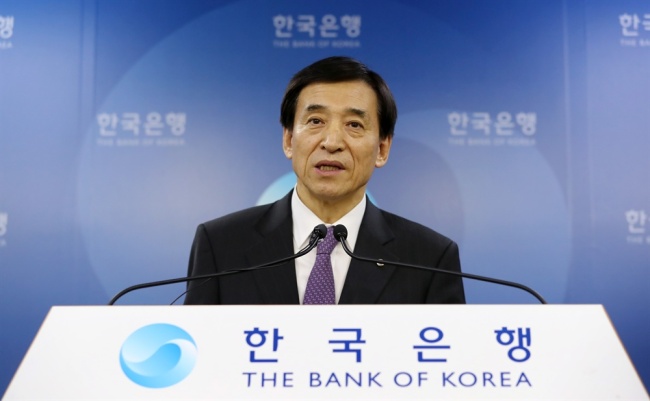US monetary normalization, trade dispute big risks for Korea: BOK chief
By YonhapPublished : Dec. 19, 2018 - 09:03
The normalization pace of US monetary policy and the ongoing trade dispute between Washington and Beijing are the two big downside risks that the South Korean economy will have to deal with next year, the central bank chief has said.
"The South Korean economy has a high reliance on trade, and its financial market is wide open. We have to be ready to cope with global issues," Bank of Korea Gov. Lee Ju-yeol said in a press meeting Tuesday.

The US Federal Reserve is widely expected to raise the fed rates this week, which would be the fourth rate hike of the year.
The US central bank upped the rates to a range of 2 percent to 2.25 percent in September, putting rate spread between the US and Korea at 0.5 percentage point.
In November, the BOK raised the policy rate by a quarter percentage point for the first time in a year to 1.75 percent.
A far wider rate spread may spark an outflow of foreign funds from the South Korean financial market. Currently, more than 30 percent of market capitalization of South Korea's benchmark KOSPI bourse is owned by foreign investors.
Despite such factors, the BOK chief said the central bank has no plan to revise its earlier growth outlook for Asia's fourth-largest economy.
In October, the BOK anticipated that the Korean economy will pull off 2.7 percent growth for next year. The finance ministry cut its 2019 growth target by 0.2-0.3 percentage point to 2.6-2.7 percent on Monday.
"Macroeconomic conditions will likely not worsen next year," he said. "The government is determined to implement stimulus packages to boost the economy, and this will offset such downside risks like the US-China trade dispute and concerns over the slowing US economy."
Many private institutions and think tanks have forecast that the South Korean economy will grow 2.3-2.6 percent in 2019, down from 2.7 percent in 2018.
He said the bank will put its monetary policy focus on seeking financial stability and stimulating the economy at the same time next year.
"Household debt is still increasing fast, although the pace has been slowing down slightly," the governor said. "If this upside tempo continues, the South Korean economy will be less resilient to external shocks. We have to be cautious."
South Korea's household credit, which surpassed 1,500 trillion won ($1.33 trillion) as of the end of September, has been on a record-breaking increase for nearly four years thanks to government-led economy boosting measures and expansionary monetary policy.
The incumbent Moon Jae-in government, which took office in May last year, has been trying to cool down the overheated housing market and called on the central bank to raise the key rate. (Yonhap)





![[From the Scene] Monks, Buddhists hail return of remains of Buddhas](http://res.heraldm.com/phpwas/restmb_idxmake.php?idx=644&simg=/content/image/2024/04/19/20240419050617_0.jpg&u=20240419175937)




![[Graphic News] French bulldog most popular breed in US, Maltese most popular in Korea](http://res.heraldm.com/phpwas/restmb_idxmake.php?idx=644&simg=/content/image/2024/04/18/20240418050864_0.gif&u=)




![[From the Scene] Monks, Buddhists hail return of remains of Buddhas](http://res.heraldm.com/phpwas/restmb_idxmake.php?idx=652&simg=/content/image/2024/04/19/20240419050617_0.jpg&u=20240419175937)

![[KH Explains] Hyundai's full hybrid edge to pay off amid slow transition to pure EVs](http://res.heraldm.com/phpwas/restmb_idxmake.php?idx=652&simg=/content/image/2024/04/18/20240418050645_0.jpg&u=20240419100350)

![[Today’s K-pop] Illit drops debut single remix](http://res.heraldm.com/phpwas/restmb_idxmake.php?idx=642&simg=/content/image/2024/04/19/20240419050612_0.jpg&u=)